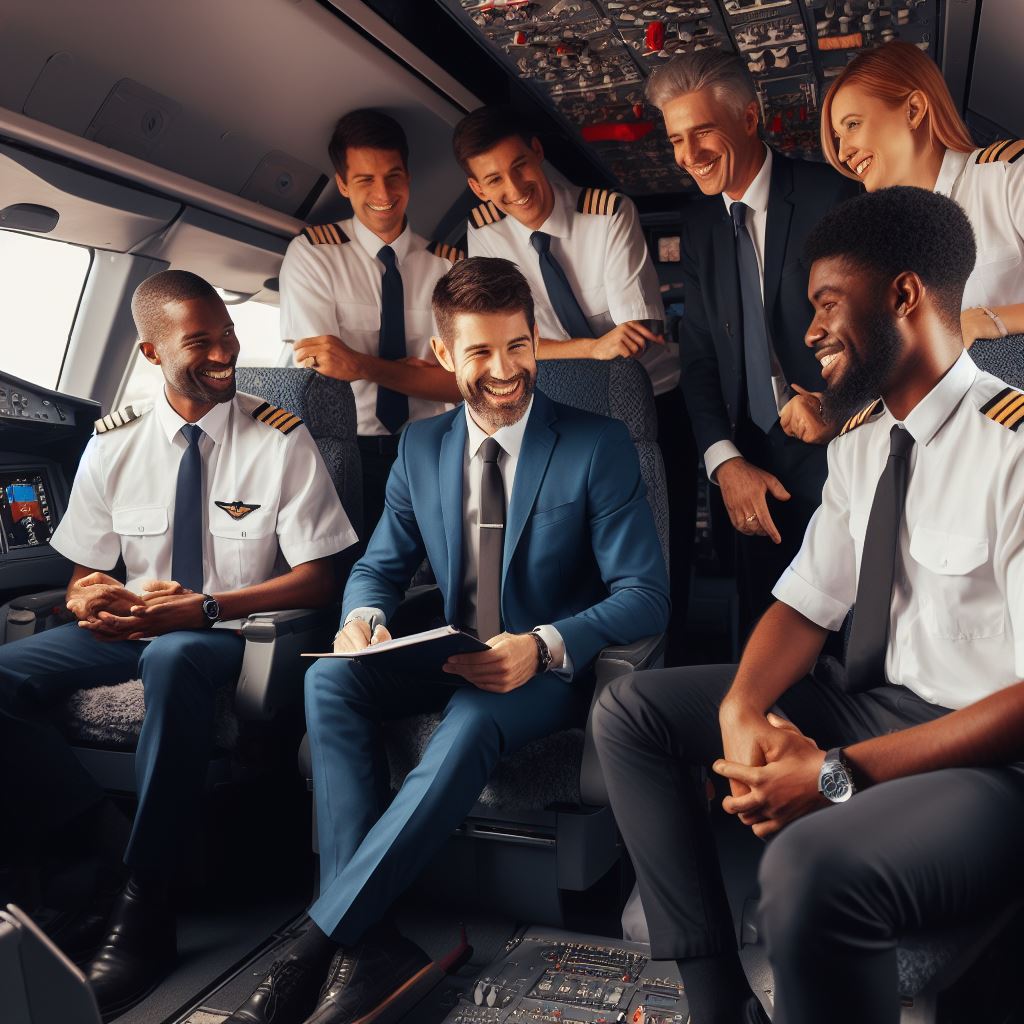Introduction
FAA certifications for pilots are of utmost importance for ensuring safe and efficient aviation operations.
In this blog post, we will provide an in-depth overview of FAA certifications and their significance for pilots.
From understanding the different types of certifications to the process involved in obtaining them, we will cover everything you need to know.
A. Why are FAA certifications important?
FAA certifications validate a pilot’s knowledge, skills, and proficiency, ensuring they meet the highest standards set by the Federal Aviation Administration.
These certifications are crucial for pilots to demonstrate their capability to operate aircraft safely and comply with aviation regulations.
Without these certifications, pilots would not be authorized to perform specific tasks or fly certain types of aircraft.
B. Overview of the blog post content
In this blog post, we will delve into the various certifications offered by the FAA, such as private pilot, commercial pilot, and airline transport pilot certificates.
We will also explore the requirements and qualifications for each certification, including the necessary training, flight hours, and medical examinations.
Additionally, we will discuss the importance of ongoing training and the need for pilots to stay up-to-date with the latest regulations.
Furthermore, we will touch upon the process of obtaining FAA certifications, highlighting the steps involved, such as written examinations, practical flight tests, and check rides.
We will also provide insights into the resources available for pilot training and preparation for FAA certifications.
By the end of this blog post, you will have a comprehensive understanding of FAA certifications for pilots and their role in maintaining aviation safety.
So, let’s dive in and explore the world of FAA certifications together!
Read: Union Representation: Benefits for American Truck Drivers
FAA Certification Levels
In the world of aviation, the Federal Aviation Administration (FAA) plays a crucial role in ensuring the safety and competence of pilots.
FAA certifications are necessary for pilots to pursue their careers and enjoy the privileges associated with each level.
This blog section will provide an in-depth understanding of the different FAA certifications for pilots.
A. Private Pilot Certification
Private Pilot Certification is the first step towards becoming a professional pilot. It allows individuals to fly for pleasure or personal transportation.
To be eligible, one must be at least 17 years old, pass a medical examination, and have a minimum of 40 hours of flight time, including specific training requirements.
The training process involves both flight and ground instruction, covering various aspects such as aircraft systems, the principles of flight, navigation, and emergency procedures.
Transform Your Career Today
Unlock a personalized career strategy that drives real results. Get tailored advice and a roadmap designed just for you.
Start NowKnowledge exams evaluating a candidate’s understanding of these subjects must also be passed.
With a Private Pilot Certification, pilots have the privilege to fly during the day and night, and they can carry passengers. However, they are not permitted to fly for compensation or hire.
B. Instrument Rating Certification
Instrument Rating Certification allows pilots to fly in conditions where visibility is reduced, such as clouds or low visibility due to weather conditions.
This certification enhances a pilot’s skills and enables them to fly solely using the aircraft’s instruments.
Pilots seeking an Instrument Rating Certification must have a Private Pilot Certification and meet the required flight experience, which includes a minimum of 50 hours of cross-country flight time.
The training process includes instrument flight training, cross-country flights, and an instrument proficiency check.
The instrument proficiency check evaluates the pilot’s ability to operate an aircraft solely by reference to instruments, ensuring they can handle challenging weather conditions.
Instrument Rating Certification is a valuable addition to a pilot’s qualifications, allowing them to fly in a wider range of conditions.
C. Commercial Pilot Certification
Commercial Pilot Certification is the next level after Private Pilot Certification and enables pilots to fly for compensation or hire. It requires a higher level of knowledge, skill, and experience.
To obtain a Commercial Pilot Certification, pilots must be at least 18 years old and hold a Private Pilot Certification.
They must also meet specific experience criteria, including a minimum flight time of 250 hours, including certain cross-country and instructional hours.
The training process for Commercial Pilot Certification focuses on advanced flight maneuvers, emergency procedures, and a deeper understanding of aircraft systems.
Pilots must pass knowledge exams and demonstrate proficiency in flight maneuvers during practical examinations to obtain this certification.
D. Airline Transport Pilot Certification
The Airline Transport Pilot Certification is the highest level of certification a pilot can achieve.
It qualifies pilots to serve as captains or first officers on large commercial aircraft and carry a higher level of responsibility.
To be eligible for an Airline Transport Pilot Certification, pilots must be at least 23 years old, hold a Commercial Pilot Certification, and have specific flight experience, including a minimum of 1,500 hours of flight time.
The training and evaluation process for Airline Transport Pilot Certification entails advanced training in aircraft systems, decision-making, crew resource management, and emergency procedures.
Pilots must pass written exams and practical flight tests to demonstrate their competence to operate large commercial aircraft.
In essence, FAA certifications for pilots are essential for their professional growth and safety.
From Private Pilot Certification to Airline Transport Pilot Certification, each level equips pilots with the necessary knowledge, skills, and experience to progress in their careers.
Transform Your Career Today
Unlock a personalized career strategy that drives real results. Get tailored advice and a roadmap designed just for you.
Start NowWhether flying for pleasure or pursuing a career in aviation, FAA certifications ensure pilots meet the standards set by the FAA to ensure the safety of the skies.
Read: Surviving Winter: Tips for Truck Drivers in Snowy Conditions
Discover More: Truck Driver Health: Staying Fit on the Road
Discover More: Material Handler Job Satisfaction Factors
Additional FAA Certifications
When it comes to pursuing a career in aviation, individuals have various options beyond pilot certifications.
Aspiring pilots can consider additional FAA certifications that can provide opportunities in teaching, operating unmanned aircraft systems (UAS), or working as aircraft mechanics.
A. Flight Instructor Certification
1. Becoming a certified flight instructor
To become a certified flight instructor, pilots must meet certain requirements set by the FAA.
These requirements include holding a commercial pilot certificate, having a minimum flight experience of 250 hours, and passing a flight and written exam.
2. Responsibilities and privileges
Flight instructors play a crucial role in teaching and training future pilots.
They are responsible for imparting theoretical knowledge and practical flying skills.
Flight instructors have the privilege of transmitting their passion for aviation to their students and molding them into safe and competent pilots.
3. Types of flight instructor certificates
There are three main types of flight instructor certificates issued by the FAA: Certified Flight Instructor (CFI), Certified Flight Instructor – Instrument (CFII), and Multi-Engine Instructor (MEI).
Each certificate enables the instructor to teach specific categories of aircraft and instrument ratings.
B. Remote Pilot Certification
1. Overview of the remote pilot certification process
The remote pilot certification is designed for individuals who want to operate unmanned aircraft systems, commonly known as drones, for commercial purposes.
The process involves passing an aeronautical knowledge test administered by the FAA.
2. Specific requirements for flying unmanned aircraft systems (UAS)
Remote pilots must adhere to specific requirements when flying UAS.
These include operating within visual line of sight, not flying over people, obtaining necessary airspace authorizations, conducting pre-flight inspections, and following all FAA regulations and guidelines.
3. Privileges and limitations of remote pilot certification
Remote pilot certification grants individuals the privilege of operating UAS for commercial purposes.
However, there are limitations, such as flying only in Class G airspace and restrictions on maximum altitude and groundspeed.
Additional waivers or authorizations may be required for certain operations.
Transform Your Career Today
Unlock a personalized career strategy that drives real results. Get tailored advice and a roadmap designed just for you.
Start NowC. Aircraft Mechanic Certification
1. Types of aircraft mechanic certificates
The FAA offers several types of aircraft mechanic certificates, including Airframe and Powerplant (A&P) Mechanic, Airframe Mechanic, and Powerplant Mechanic.
Each certificate focuses on different areas of aircraft maintenance, repair, and inspection.
2. Eligibility criteria and examination process
To qualify for an aircraft mechanic certificate, individuals must meet specific eligibility criteria, including age requirements and practical experience.
They also need to pass a series of written, oral, and practical exams administered by the FAA or an approved Aviation Maintenance Technician School.
3. Job opportunities for certified aircraft mechanics
Obtaining an aircraft mechanic certification opens up numerous job opportunities in the aviation industry.
Certified aircraft mechanics can work in airline maintenance departments, aircraft manufacturing companies, repair stations, and general aviation facilities.
The demand for skilled aircraft mechanics is expected to grow steadily in the coming years.
In fact, while pilot certifications are essential for aspiring aviators, exploring additional FAA certifications can provide diverse career pathways in aviation.
Whether one chooses to become a flight instructor, operate unmanned aircraft systems (UAS), or work as an aircraft mechanic, pursuing these certifications can open up exciting and fulfilling opportunities within the aviation industry.
Read: US Truck Stops: More Than Just a Rest Place

Learn More: U.S. Logistics Education: Top Schools and Programs Reviewed
Delve into the Subject: Training & Education Pathways for Air Traffic Control in the USA
Maintaining FAA Certifications
Once pilots obtain their FAA certifications, it is crucial to maintain them to ensure they remain qualified and competent in their roles.
This section will explore the currency requirements for different certifications and the importance of regular training and continuing education.
A. Currency requirements for different certifications
1. Flight hours and recency
Pilots must accumulate a certain number of flight hours within a specific timeframe to maintain their certifications.
This requirement ensures they stay proficient and capable of safely operating an aircraft.
2. Medical assessments
Regular medical assessments are necessary to ensure that pilots are physically and mentally fit to fly.
These assessments evaluate a pilot’s overall health and well-being, reducing the risk of any medical conditions impacting their ability to safely operate an aircraft.
3. Proficiency exams
Pilots are required to undergo periodic proficiency exams to demonstrate their knowledge and skills.
These exams assess various aspects of their piloting abilities, such as emergency procedures, navigation, and communication.
Transform Your Career Today
Unlock a personalized career strategy that drives real results. Get tailored advice and a roadmap designed just for you.
Start NowSuccessful completion of these exams ensures that pilots remain competent in their roles.
B. Regular training and continuing education
1. Importance of staying current
Regular training and continuing education are essential for pilots to stay up-to-date with the latest regulations, technologies, and best practices.
This ongoing learning ensures they are equipped with the necessary knowledge and skills to adapt to evolving aviation standards.
2. Available resources for ongoing training
Pilots have access to various resources to fulfill their ongoing training requirements.
These resources include flight simulators, online courses, industry conferences, and workshops.
Utilizing these resources enables pilots to enhance their knowledge and skills in a convenient and effective manner.
3. Professional development options
Pilots can take advantage of professional development options to further their careers and expand their expertise.
This may include pursuing additional certifications or qualifications, such as instrument ratings or specific aircraft endorsements.
Engaging in continuous professional development helps pilots stay competitive in the aviation industry.
In general, maintaining FAA certifications involves meeting currency requirements through flight hours, medical assessments, and proficiency exams.
Additionally, regular training and continuing education are vital for pilots to stay current and further their professional development.
By prioritizing these aspects, pilots can ensure they remain skilled, knowledgeable, and capable of safely operating aircraft.
Read: The Future of Self-Driving Trucks in the US
Conclusion
To recap, FAA certifications for pilots are crucial for ensuring safety and competence in aviation.
These certifications validate a pilot’s skills and knowledge, allowing them to fly different types of aircraft and operate in various conditions.
Aspiring pilots should be encouraged to explore and pursue the appropriate FAA certifications that align with their career goals.
Whether it be a private pilot certificate, instrument rating, or commercial pilot license, each certification adds value and opens up new opportunities in the aviation industry.
In closing, FAA certifications serve as a foundation for a pilot’s career and are a testament to their dedication and expertise.
Pilots who hold these certifications are recognized and respected within the aviation community.
If you’re aspiring to become a pilot or are already on your journey, take the initiative to research and understand the different FAA certifications available.
Transform Your Career Today
Unlock a personalized career strategy that drives real results. Get tailored advice and a roadmap designed just for you.
Start NowSeek guidance from experienced pilots or flight instructors to navigate through the certification process efficiently.
Remember, having FAA certifications not only enhances your skills but also increases your employment prospects and demonstrates your commitment to aviation safety.
So, don’t hesitate to pursue the appropriate FAA certifications and unlock your full potential as a pilot.
Take control of your career and soar to new heights with FAA certifications. Start your journey today and become a certified pilot who can confidently navigate the skies.




